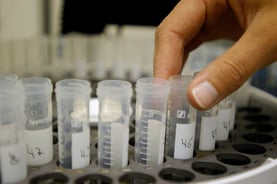 Since it's founding in 2006, the Herbert and Florence Irving Institute for Clinical and Translational Research at the Columbia University Medical Center, in partnership with the New York-Presbyterian Hospital in New York, has provided more than 2,000 scientists with new opportunities of conducting clinical and translational research leading to quicker developments and deliveries of treatments. Recently, the National Center for Advancing Translational Sciences (NCATS) awarded the Irving Institute a grant of $58.4 million over the next five years to help the Institute further the translational research being conducted.
Since it's founding in 2006, the Herbert and Florence Irving Institute for Clinical and Translational Research at the Columbia University Medical Center, in partnership with the New York-Presbyterian Hospital in New York, has provided more than 2,000 scientists with new opportunities of conducting clinical and translational research leading to quicker developments and deliveries of treatments. Recently, the National Center for Advancing Translational Sciences (NCATS) awarded the Irving Institute a grant of $58.4 million over the next five years to help the Institute further the translational research being conducted.
This most recent grant brings the total amount of funding from the NCATS to the Irving Institute up to $151 million since 2006, from three separate grants.(Image courtesy of Johannes Jansson via Wikimedia Commons)
Steven J. Corwin, MD, President and CEO of New York-Presbyterian has said: “The Irving Institute is conducting some of the most promising research today, especially with regards to precision medicine. This grant represents an investment in the search for the next generation of highly effective, personalized therapies for all patients.”
The $58.4 million will help researchers in New York further the work they began 10 years ago. Through the grant, researchers will work with the Precision Medicine Initiative at Columbia University to help the development of new therapeutics by providing resources necessary for research and training. Researchers will also participate in both national and international clinical research networks.
Director of the Irving Institute, Henry N. Ginsbery, MD, explained that: “It is, of course, extremely gratifying to have received our third CTSA Program grant. During the past 10 years, funding from our CTSA Program hub has played a pivotal role in training and supporting young investigators, providing critical infrastructure support for both preclinical and patient-oriented research, and developing collaborations with the communities of Northern Manhattan." (Image of the Columbia University Medical Center in New York courtesy of Mightychip26 via Wikimedia Commons)
(Image of the Columbia University Medical Center in New York courtesy of Mightychip26 via Wikimedia Commons)
|
New Research Facility Brings the Future of Medicine to Columbia University Research Lab Expansion at Rockefeller University UChicago and Evelo Biosciences to Develop New Cancer Immunotherapy |
Columbia University is a highly ranked research institution in terms of the amount of science research funding received and the amount of research published and produced. In the 2015 fiscal year, the Columbia University received more than $331.3 million in funding from the National Institutes of Health (NIH) alone. Some projects at the university benefiting from this funding include:
- Columbia University received a share of a $40 million boost from the Kavli Foundation as a part of the President's BRAIN Initiative which rewards high-risk, interdisciplinary research.
- Columbia University Medical Center formed a $30 million alliance with Biogen Idec to target genetic research on discovering the underlying causes of diseases and identifying new treatment opportunities.
- The Herbert Irving Comprehensive Cancer Center at CUMC received an $18 million, five year Cancer Center Support Grant from the NCI in recognition of its impactful basic and clinical research.
Interested in marketing lab products and supplies to active life science researchers in the well-funded Columbia marketplace? If so, exhibit at the upcoming 7th SemiAnnual BioResearch Product Faire™ Event in New York coming up on September 29, 2016. This event brings lab and chemical supply specialists together with hundreds of researchers, PI's, grad students, lab managers, professors, purchasing agents and other lab staff interested in finding the best and newest equipment and technologies to use in their lab. The event is held each year at the Armory Track and Field, adjacent to the Columbia University campus.
To learn more about participating in the upcoming 9/29/16 event in New York, please visit the link below:
Researchers from Columbia University looking for the newest tools and technologies available to use in their labs are encouraged to attend this free event. Visit the following link for more information, and to pre-register for the event:



